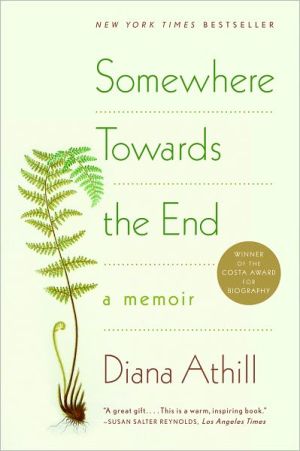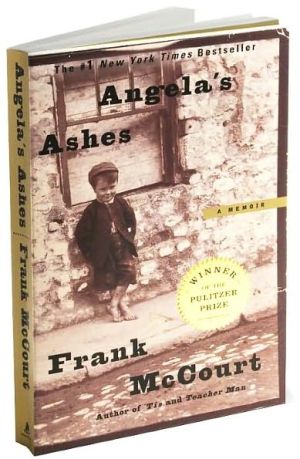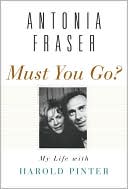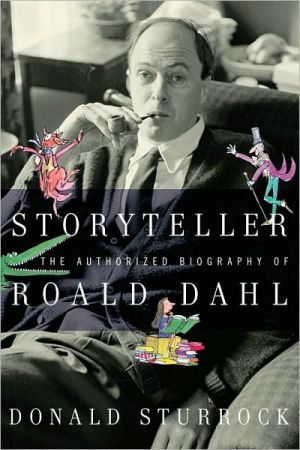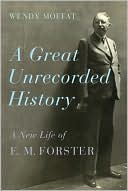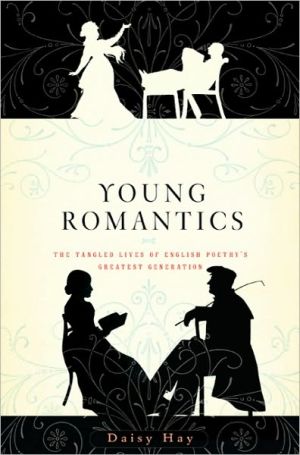Somewhere Towards the End: A Memoir
Winner of the 2009 National Book Critics Circle Award in Autobiography and a New York Times bestseller: a prize-winning, critically acclaimed memoir on life and aging —“An honest joy to read” (Alice Munro).\ Hailed as “a virtuoso exercise” (Sunday Telegraph), this book reflects candidly, sometimes with great humor, on the condition of being old. Charming readers, writers, and critics alike, the memoir won the Costa Award for Biography and made Athill, now ninety-one, a surprising literary...
Search in google:
Winner of the 2009 National Book Critics Circle Award in Autobiography and a New York Times bestseller: a prize-winning, critically acclaimed memoir on life and aging —“An honest joy to read” (Alice Munro). The Barnes & Noble Review The old write to us from the past in language that seems to be clearer, less cluttered than our own. Think of V. S. Pritchett or Penelope Fitzgerald in their 80s, Patrick Leigh Fermor or P. G. Wodehouse nearing their 90s, all models still of accuracy and economy on the page. We should credit not their years, perhaps, but their time. Such writers inhabited a pre-electronic era when words were carefully expended and sentences retained a classical elegance. The opening of Wodehouse's 1935 novel The Luck of the Bodkins is a famous example: "Into the face of the young man who sat on the terrace of the Hotel Magnifique at Cannes there had crept a look of furtive shame, the shifty, hangdog look which announces that an Englishman is about to talk French."
\ San Francisco ChronicleThere is something terrifically comforting about a nonagenarian writing with clarity, wit and verve about getting old and facing death. . . . [Athill] evokes another grande dame of British letters in her uninhibited lifestyle and no-holds-barred, clarion voice: last year’s Nobel Prize winner, Doris Lessing.— N. Heller McAlpin\ \ \ \ \ Los Angeles TimesA great gift. . . . This is a warm, inspiring book.— Susan Salter Reynolds\ \ \ The Costa Award JudgesA perfect memoir of old age—candid, detailed, charming, totally lacking in self-pity or sentimentality and above all, beautifully, beautifully written.\ \ \ \ \ The New York TimesWelcome and original.— Dwight Garner\ \ \ \ \ The New York Times Book ReviewShe writes as a person of wide-ranging learning, a generalist, a lover of men and animals and a garden enthusiast, a person intoxicated with life.— Erica Jong\ \ \ \ \ PeopleBracingly frank…joyful rather than grim… she offers clear-eyed wisdom of the grandma-you-wish-you’d-had variety.\ \ \ \ \ SalonTo paraphrase Shakespeare, wisdom is bred in neither the heart nor the head, but in the bones that carry us through the decades. A few very talented artists, like Diana Athill, may persuade their old bones to yield up a glimpse or two of what they’ve learned.— Laura Miller\ \ \ \ \ Literary ReviewJean Rhys said that literature was a lake, and what mattered was to contribute to it, even if only a trickle. She contributed a narrow boiling river. Diana Athill has contributed a cool clear burn.— Carole Angier\ \ \ \ \ Boston GlobeAthill writes…with clarity, calm, and common sense.— Barbara Fisher\ \ \ \ \ Washington Post Book WorldUnusually appealing. . . . To readers Athill delivers far more than modest pleasure: Her easy-going prose and startling honesty are riveting, for whither she has gone many of us will go as well.— Michael Dirda\ \ \ \ \ The New YorkerA spry dispatch on the condition of being elderly.\ \ \ \ \ Financial TimesLife, not death, is her preoccupation…Reflections on old age, rather than on a long life lived are rare…It is rarer still for a woman to write such a book: so Athill’s candor and economic prose on religion, regrets, and sex are invigorating.— Emma Jacobs\ \ \ \ \ Michael DirdaTo readers Athill delivers far more than modest pleasure: Her easy-going prose and startling honesty are riveting, for whither she has gone many of us will go as well…A refusal to sugar-coat and a commitment to utter frankness, coupled with an engaging style, make Diana Athill's Somewhere Towards the End unusually appealing, despite its inherently cheerless subject.\ —The Washington Post\ \ \ \ \ Dwight GarnerMs. Athill's book is welcome and original because she is such a robust, free-thinking, nonmawkish presence on the page. She catalogs the indignities of old age while reminding us how much joy can be sucked out of a physically diminished life, joy that often comes from unexpected places…We are all amassing big stakes in our own ends, and Ms. Athill's frankness and good cheer in the face of that fact are comforting. Still, she hopes her own disappearance from this planet "does not come too soon." Anyone who's read her will be in complete agreement.\ —The New York Times\ \ \ \ \ Erica Jong[Athill's] memoir is captivating because of her fearlessness of death, her sense that death is another adventure in her adventurous life.\ —The New York Times Book Review\ \ \ \ \ Publishers WeeklyWhen it comes to facing old age, writes Athill, "there are no lessons to be learnt, no discoveries to be made, no solutions to offer." As the acclaimed British memoirist (who wrote about her experiences as a book editor in Stet) pushes past 90, she realizes that "there is not much on record on falling away" and resolves to set down some of her observations. She is bluntly unconcerned with conventional wisdom, unapologetically recounting her extended role as "the Other Woman" in her companion's prior marriage-then explaining how he didn't move in with her until after they'd stopped having sex, which is why it was no big deal for her to invite his next mistress to move in with them to save expenses. She is equally frank in discussing how, as their life turns "sad and boring," she copes with his declining health, just as she cared for her mother in her final years. Firmly resolute that no afterlife awaits her, Athill finds just enough optimism in this world to keep her reflections from slipping into morbidity-she may not offer much comfort, but it's a bracing read. (Jan.)\ Copyright © Reed Business Information, a division of Reed Elsevier Inc. All rights reserved.\ \ \ \ \ Daily Mail[A] little literary gem, penned by a marvelous, feisty old character whom, quite honestly, I’d just love to have as my grandmother…What a treasure.— Val Hennessy\ \ \ \ \ The Irish TimesAn astute editor, she writes with precision and clarity, using one word to convey an idea that a lesser writer might expand into a paragraph….[Athill is] an enlightened woman.— Mary Russell\ \ \ \ \ The Barnes & Noble ReviewThe old write to us from the past in language that seems to be clearer, less cluttered than our own. Think of V. S. Pritchett or Penelope Fitzgerald in their 80s, Patrick Leigh Fermor or P. G. Wodehouse nearing their 90s, all models still of accuracy and economy on the page. We should credit not their years, perhaps, but their time. Such writers inhabited a pre-electronic era when words were carefully expended and sentences retained a classical elegance. The opening of Wodehouse's 1935 novel The Luck of the Bodkins is a famous example: "Into the face of the young man who sat on the terrace of the Hotel Magnifique at Cannes there had crept a look of furtive shame, the shifty, hangdog look which announces that an Englishman is about to talk French." \ And here is Diana Athill, in her new memoir Somewhere Towards the End, recalling the Bulgarian writer Elias Canetti: "He had a central European's respect for the construction of abstract systems of thought about the inexplicable, which is uncongenial to many English minds, and which caused him to overvalue his own notions to the extent of publishing two volumes of aphorisms." In one sentence, we have an immediate perception of Canetti's ego and his world, of British intellectual habits and of Athill's cool eye.\ Such graceful compression, along with Athill's wit and honesty, make this slim memoir of her 91 years and her reflections on old age and death seem like an afternoon of easy conversation. Beneath this effortless, chatty style, however, lie decades of training. For over 50 years, Diana Athill was one of the 20th century's most respected book editors. Working with her friend and colleague Andre Deutsch, whose firm was the first to publish V. S. Naipaul, Mordecai Richler, and Brian Moore, among others, Athill edited John Updike, Stevie Smith, Margaret Atwood, and the like. She described that time in her previous memoir, Stet, and her childhood in the sweet recollection Yesterday Morning, the latter written when she was 85. There are echoes of both books here, but Somewhere Towards the End -- being about the end -- is necessarily more distilled. The novelist Jean Rhys, for example, materializes briefly but vividly when Athill recalls a phrase that Rhys used "usually about being drunk: 'I was a bit drunk, well very.' She never said 'I was a bit sad, well very' about being old, but no doubt she would have done if she had not hated and feared it too much to speak of it."\ Athill, at least on the page, neither hates nor fears being old. Frustrated often by the daily reality of decline and saddened by the prospect of leaving a beloved life, she is, above all, practical. Never smug and never inspirational ("Perish the thought," you hear her say) she begins her memoir with the mild disappointment of ordering a tree fern for her garden, receiving a tiny seedling, and realizing that she will never see it grow to maturity. In the book's postscript, however, she concludes "I was right in thinking that I will never see it being a tree, but I underestimated the pleasure of watching it being a fern. It was worth buying." She leaves the reader to supply the echo: "It was worth living." It clearly was and still is.\ Born in 1917, Athill grew up on her grandmother's country estate in Norfolk (her father, a British Army colonel, was often away, and her mother had strayed romantically). At five, she fell in love with the gardener's son. "I doubt whether I ever spoke to Denis, but I did, with great daring, spit on his head out of the lavatory window." It was the first of many attachments, the most painful, perhaps, being an early engagement, abruptly ended by Athill's fiancé. "[I]t was not until Paul jilted me that I saw that women, too, could be cheered up by sex without love," she writes, breezily describing some wartime and postwar affairs. When Athill was 44 she met the Jamaican playwright Barry Reckford; the two became lovers and then lifetime companions, Athill's patience being tested not by his affairs (she, too, indulged) but by his deteriorating health. Yet even their shared journey through an often Kafkaesque medical world is described with refreshing candor: "And my word, the difference ?225 can make!" Athill observes when Reckford pays to see a private consultant.\ Vivid and affecting descriptions of sickness and death -- chiefly the death of her mother -- occur toward the end of the book, but they are not its culmination. This memoir meanders, in the best possible sense, and we happily follow its graceful digressions. Recollections of love, sex, and waning sexual appetite spark thoughts on religion and atheism. These, in turn, prompt musings on bed and sleep when Athill reports that Anthony Burgess, in his introduction to a book on beds that she edited, "...said he loathed them because he was afraid of going to sleep and needed to outwit his fear by letting sleep catch him unexpectedly in a chair or on the floor." Athill the atheist, by contrast, adores her bed: "From which it may correctly be deduced that I myself have never been enough troubled by [death] to want to envisage an afterlife." The prospect of immortality is, we suspect, not only too fanciful but too grandiose for this sensible woman, who regards our doomed species as "differing from the dinosaurs only in contributing a good deal more than they did to our own fate."\ As an editor and as a friend to artists, Athill encountered some monumental egos. Indeed, as a child of the British Empire, she was born into a monumental ego, that of the ruling class. But this "tribal smugness" was tempered, in her view, by three rules: "...one was supposed not to be a coward, not to tell lies, and above all not to be vain and boastful." And not, presumably, to write a confessional memoir. Athill is regarded as a pioneer of this somewhat debased genre, yet here, once again, she elevates it with deceptive ease. "I can speak only for, and to, the lucky," she cautions when describing her late-life consolations -- friendship, books, art, music, her garden -- and the largely merciful deaths that she has witnessed. Examining not her conscience but her character, she regrets chiefly "a stubborn nub of selfishness somewhere in the middle which made me wary of anything to which one has to give one's whole self," and "whenever having had the guts to escape the narrowness of my life." That last description rings false, only because Athill has convinced us too well of the opposite. --Anna Mundow\ Anna Mundow writes "The Interview" and the "Historical Novels" columns for The Boston Globe and is a contributor to The Irish Times.\ \ \
